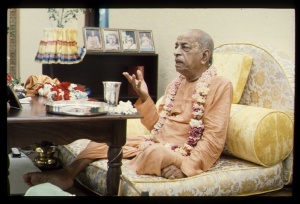CC Adi 12.20: Difference between revisions
m (1 revision(s)) |
No edit summary |
||
| Line 1: | Line 1: | ||
{{ | [[Category:Sri Caitanya-caritamrta - Adi-lila Chapter 12|C020]] | ||
<div style="float:left">'''[[Sri Caitanya-caritamrta|Śrī Caitanya-caritāmṛta]] - [[CC Adi|Ādi-līlā]] - [[CC Adi 12|Chapter 12: The Expansions of Advaita Acārya and Gadādhara Paṇḍita]]'''</div> | |||
<div style="float:right">[[File:Go-previous.png|link=CC Adi 12.19|Ādi-līlā 12.19]] '''[[CC Adi 12.19|Ādi-līlā 12.19]] - [[CC Adi 12.21|Ādi-līlā 12.21]]''' [[File:Go-next.png|link=CC Adi 12.21|Ādi-līlā 12.21]]</div> | |||
{{CompareVersions|CC|Adi 12.20|CC 1975|CC 1996}} | |||
{{RandomImage}} | |||
==== TEXT 20 ==== | ==== TEXT 20 ==== | ||
<div | <div class="verse"> | ||
guṇḍicā-mandire mahāprabhura sammukhe | :guṇḍicā-mandire mahāprabhura sammukhe | ||
kīrtane nartana kare baḍa prema-sukhe | :kīrtane nartana kare baḍa prema-sukhe | ||
</div> | </div> | ||
| Line 14: | Line 16: | ||
==== SYNONYMS ==== | ==== SYNONYMS ==== | ||
<div | <div class="synonyms"> | ||
guṇḍicā- | ''guṇḍicā-mandire''—in the Guṇḍicā-mandira in Jagannātha Purī; ''mahāprabhura''—of Lord Caitanya Mahāprabhu; ''sammukhe''—in front; ''kīrtane''—in saṅkīrtana; ''nartana''—dancing; ''kare''—does; ''baḍa''—very much; ''prema-sukhe''—in transcendental bliss. | ||
</div> | </div> | ||
| Line 21: | Line 23: | ||
==== TRANSLATION ==== | ==== TRANSLATION ==== | ||
<div | <div class="translation"> | ||
When Lord Caitanya personally cleansed the Guṇḍicā-mandira in Jagannātha Purī, Gopāla danced in front of the Lord with great love and happiness. | When Lord Caitanya personally cleansed the Guṇḍicā-mandira in Jagannātha Purī, Gopāla danced in front of the Lord with great love and happiness. | ||
</div> | </div> | ||
| Line 28: | Line 30: | ||
==== PURPORT ==== | ==== PURPORT ==== | ||
<div | <div class="purport"> | ||
The Guṇḍicā-mandira is situated in Jagannātha Purī, and every year Jagannātha, Balabhadra and Subhadrā come there from the Jagannātha temple to stay for eight days. When Lord Caitanya Mahāprabhu lived at Jagannātha Purī, every year He personally cleansed this temple with His principal devotees. The Guṇḍicā-mārjana chapter of Caitanya-caritāmṛta (Madhya 12) describes this vividly. | The Guṇḍicā-mandira is situated in Jagannātha Purī, and every year Jagannātha, Balabhadra and Subhadrā come there from the Jagannātha temple to stay for eight days. When Lord Caitanya Mahāprabhu lived at Jagannātha Purī, every year He personally cleansed this temple with His principal devotees. The ''Guṇḍicā-mārjana'' chapter of [[Sri Caitanya-caritamrta|''Caitanya-caritāmṛta'']] ([[CC Madhya 12|Madhya 12]]) describes this vividly. | ||
</div> | </div> | ||
__NOTOC__ | |||
<div style="float:right; clear:both;">[[File:Go-previous.png|link=CC Adi 12.19|Ādi-līlā 12.19]] '''[[CC Adi 12.19|Ādi-līlā 12.19]] - [[CC Adi 12.21|Ādi-līlā 12.21]]''' [[File:Go-next.png|link=CC Adi 12.21|Ādi-līlā 12.21]]</div> | |||
__NOTOC__ | |||
__NOEDITSECTION__ | |||
Revision as of 09:28, 9 July 2021

A.C. Bhaktivedanta Swami Prabhupada
TEXT 20
- guṇḍicā-mandire mahāprabhura sammukhe
- kīrtane nartana kare baḍa prema-sukhe
SYNONYMS
guṇḍicā-mandire—in the Guṇḍicā-mandira in Jagannātha Purī; mahāprabhura—of Lord Caitanya Mahāprabhu; sammukhe—in front; kīrtane—in saṅkīrtana; nartana—dancing; kare—does; baḍa—very much; prema-sukhe—in transcendental bliss.
TRANSLATION
When Lord Caitanya personally cleansed the Guṇḍicā-mandira in Jagannātha Purī, Gopāla danced in front of the Lord with great love and happiness.
PURPORT
The Guṇḍicā-mandira is situated in Jagannātha Purī, and every year Jagannātha, Balabhadra and Subhadrā come there from the Jagannātha temple to stay for eight days. When Lord Caitanya Mahāprabhu lived at Jagannātha Purī, every year He personally cleansed this temple with His principal devotees. The Guṇḍicā-mārjana chapter of Caitanya-caritāmṛta (Madhya 12) describes this vividly.